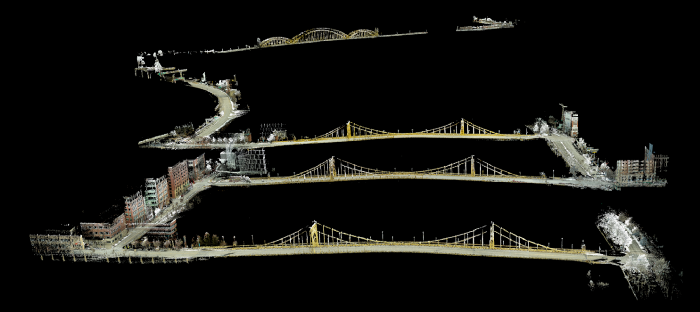Is a startup truly local if it operates remotely?
It’s a question that’s at the forefront of Technical.ly’s mind this February as we consider what local means now. In a remote-first world, how can founders and entrepreneurs collaboratively develop products or create company culture? How can they connect with others in the community? While fluctuations in COVID-19 case numbers over the past two years have allowed for the return of some in-person operations, many companies are still in a remote-first mindset — and may stay there beyond the pandemic.
Who better to ask about what these changes mean for entrepreneurship than startup founders themselves? Though Pittsburgh’s tech industry is unique in that the heavy robotics presence requires more in-person operations, there are still startups working outside of that space that are grappling with the question of place. We talked to five local founders whose companies made our inaugural RealLIST Startups in Pittsburgh about what local means now for them, and what their plans are as the pandemic (hopefully) begins to wane.
New ways of connecting with other entrepreneurs and resources
Where in-person events and offices may once have been a place for budding entrepreneurs to find the connections and resources they needed to advance their startup ideas, those opportunities now largely live online. For some, accessing those resources required a new way of leveraging existing contacts.
Sustainible cofounder and CEO Talpha Harris first came to Pittsburgh through a Venture for America fellowship and worked as entrepreneurship hub manager at Bridgeway Capital starting early in the pandemic.
“I did a lot of entrepreneurial development — I created incubators and accelerators, I met with small business owners during the pandemic. I was a counselor and a shoulder to cry on in that time,” she said. Despite the challenges of that time, “through my position, I was able to reach different networks, and so that was really a blessing because even though stuff shut down, the actual position I was in was working to combat the shutdowns [by adapting business models]. The network of connections she built in her fellowship helped her get started when she launched Sustainible in 2020.
For other founders, finding resources might come from connections in communities outside the startup world. Armin Samii, founder of bike dashcam startup Robot Armin, sees Pittsburgh’s strong biking community as a potential for friendship, user base and marketing and product feedback. Mentioning BikePGH, Pittsburgh Critical Mass and the monthly underwear ride in warm weather, Samii said, “the Pittsburgh community is so tight knit, and those are my potential clients are those potential customers, and I feel more connected to the Pittsburgh biking community that I have to any other biking community.”
A balance of in-person and remote operations
Mach9 Robotics was founded only last year after cofounders Alex Baikovitz, Haowen Shi and Joshua Spisak met at Carnegie Mellon University’s Robotics Institute. But despite the operational limitations of launching during the pandemic, Baikovitz (who is also the startup’s CEO) said Mach9 pushed for in-person work when it can.
While some of the company was grown and built online, Baikovitz said the team is “definitely excited about all working together and collaborating in an in-person setting. It’s definitely been something that will push the company forward.” Still, with the ongoing pandemic, he added that Mach9 also “understands the merits and benefits of remote type work and the flexibility that enables, but I definitely see the tremendous value in working with some pretty amazing friends to build something from the ground up all together.”
Koop Technologies cofounder and Chief Commercial Officer Kamron Khodjaev echoed those sentiments. He and his cofounders launched Koop out of a townhouse in Bloomfield where they isolated together as they got the business off the ground.
“Back then we didn’t have employees yet, so being there together throughout the pandemic helped us a lot,” he said. And when it came to communicating with people outside of the company, because of a stoppage of IRL gatherings, the pandemic “also saved us a lot of early funds that we’d have spent traveling back in the day and meeting face to face.” Now, the startup operates on a mix of remote and in-person work out of its office at Nova Place on the North Side.
One place where remote operations worked well for Koop, Khodjaev said, was when it came to raising the company’s $2.5 million seed round last August.
“We closed our round completely remotely. And if you told me back when I worked in VC that someone’s going to close the round remotely over a phone call, I’d have said that’s not going to happen,” he said. Before the pandemic, “everyone wants to see who they’re working with [in person]. But things changed and kind of opened the boundaries of what’s possible.”
Finding a local identity in a remote world
So then, amid a blend of in-person and remote operations, what makes a Pittsburgh startup a Pittsburgh startup? It comes from an alignment with existing communities, institutions, organizations and more in the area, founders said. Melinda Su En Lee, cofounder and CEO of Parcel Health, relies on the network afforded by her startup’s participation in AlphaLab Health, while Harris and Samii have the help of resources provided by the city-run accelerator they’ve participated in, PGH Lab.
But for others, like Baikovitz and Khodjaev, that identity can also come from specialized industry activity. For Mach9, Baikovitz said it helps to have organizations like the Pittsburgh Robotics Network so active in bringing people together. And that extended to the autonomous vehicle industry that Koop Technologies works with too.
“Pittsburgh is claiming to be one of the robotics capitals of the world,” Baikovitz said. “And we’re happy to obviously be here in the same city and feeding on the same energy to build a company that solves a lot of real-world problems and extend this amazing technology built in self-driving into really new areas that it’s never seen before.”
Sophie Burkholder is a 2021-2022 corps member for Report for America, an initiative of The Groundtruth Project that pairs young journalists with local newsrooms. This position is supported by the Heinz Endowments.
This editorial article is a part of What Local Means Now Month of Technical.ly's 2022 editorial calendar.
Before you go...
Please consider supporting Technical.ly to keep our independent journalism strong. Unlike most business-focused media outlets, we don’t have a paywall. Instead, we count on your personal and organizational support.
Join our growing Slack community
Join 5,000 tech professionals and entrepreneurs in our community Slack today!

The person charged in the UnitedHealthcare CEO shooting had a ton of tech connections

From rejection to innovation: How I built a tool to beat AI hiring algorithms at their own game

Where are the country’s most vibrant tech and startup communities?


